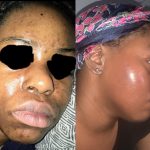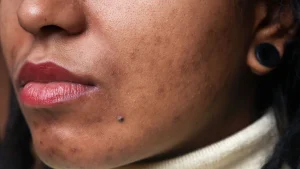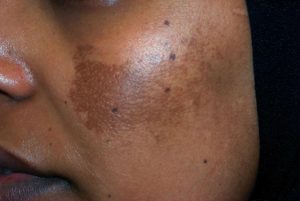
How To Use Body Oil For Radiant Skin
June 17, 2024
Cause Of Uneven Skin Tone & How To Prevent It
July 1, 2024If you’re African with dark skin, you probably have more than one skin tone (in spots and/or patches) on some parts of your body. That could be ‘hyperpigmentation’ which is when an area of skin becomes darker than the skin around it. Many things can cause it and it can affect many skin tones. But it’s often more intense and can last longer on people with dark skin. It can also affect the way you feel about your skin.
Whether you are looking to target dark spots that never seem to go away or simply want a brighter and more even skin tone, learn more about what causes hyperpigmentation and how you can treat existing skin discolourations and help prevent new ones from forming.
What Is Hyperpigmentation?
Hyperpigmentation is the discolouration of areas of the skin which occurs when skin darkens in spots or areas due to an increase in melanin. Please note that hyperpigmentation is different from Vitiligo which is another skin condition that presents as discolouration of the skin in patches. While it is one of the most common skin conditions, especially for people with dark skin, it can be difficult to treat (depending on the type of hyperpigmentation you have). While hyperpigmentation is physically harmless, it’s typically more severe and longer-lasting in people with dark skin. Because of this, it can cause a high degree of psychological stress and impact your quality of life. This is why effective treatment is important.

Causes Of Hyperpigmentation
Although melanin overproduction is the main cause of hyperpigmentation, several other factors can lead to hyperpigmentation including:
- Hormones and genetics,
- Skin irritation or damage,
- Sun exposure, and
- Pollution.
Types Of Hyperpigmentation
Our skin consists of different tissue layers; the outermost layer is the epidermis while the deeper layer (below the epidermis) is the dermis. Hyperpigmentation can often affect the epidermis, the dermis, or both.
When hyperpigmentation affects the epidermis, it is called ‘epidermal hyperpigmentation’. When it affects the dermis, it is called ‘dermal hyperpigmentation’. Typically, epidermal hyperpigmentation is easier to treat, although it may take several months to see improvement. Dermal hyperpigmentation on the other hand is more difficult to treat and, in some cases, can be permanent.
There is also periorbital hyperpigmentation (POH) which is when hyperpigmentation happens around your eyes. It is often caused by the usual factors listed above, including swelling around the eyes, or anatomical changes around the eyes. People with this condition have dark spots around their eyes that can sometimes give them a tired appearance.
How To Prevent Hyperpigmentation
As is often repeated in skincare, it is best to prevent skin issues than to treat them. If you don’t have any hyperpigmentation (you are one lucky human!), be sure to defend your skin from the direct causes of discolouration and dark spots by following these steps below to keep your skin looking bright and clear:
- Wear sunscreen daily: Even on cloudy days, UV rays from the sun can cause dark spots. However, using a daily sunscreen can help prevent this.
- If you have acne-prone skin, use skincare products that are specifically formulated to help prevent and treat acne like the Acne & Skin Irritation Sample Pack, Salicylic Acid or Sulfur. These products can help visibly reduce breakouts and help prevent post-inflammatory hyperpigmentation from acne and skin injuries.
- If you do have a breakout, use an acne spot treatment to help visibly clear your skin. Avoid picking at or popping blemishes as this can increase the likelihood of post-acne marks.
- Apply an antioxidant product along with sunscreen with pollution protection to help protect your skin from pollution and free radicals.
How To Treat Hyperpigmentation
The easiest and most common way to effectively treat hyperpigmentation is to start a brightening skincare routine that will help you boost your skin’s clarity and tone. Although hyperpigmentation will not disappear overnight, using targeted skincare products like serums and treatments, coupled with daily use of broad-spectrum sunscreen can help you speed up the process.
When hyperpigmentation is caused by skin conditions like acne and psoriasis, treating these conditions first can slow or stop the appearance of new dark spots. For the best result, consult your dermatologist to diagnose and set up a treatment plan that’s appropriate for your specific condition. You must stick to this plan to prevent the occurrence of additional hyperpigmented spots.
Best Ingredients For Treating Hyperpigmentation
To help visibly fade hyperpigmentation and discolourations, look for skincare products with ingredients that are proven to brighten the skin such as:
- Vitamin C
Vitamin C is an ingredient known to help brighten skin by effectively absorbing into the skin’s layers. It helps decrease the skin’s melanin production, prevent the formation of new melanin clusters, and even slow the melanin transfer to the skin’s surface. It also helps visibly fade existing dark spots for a brighter, more even skin tone.
- Green Tea:
Green Tea is known for its antioxidant and anti-inflammatory properties. Green tea causes skin-lightening effects and is also effective in managing hyperpigmentation lesions. It has also been found to be effective in preventing skin redness caused by ultraviolet (UV) radiation. To use green tea for skin, you can make a green tea face mask, put green tea in your homemade mask recipes, or use the Kanda Tea soap which is formulated with green tea.
As mentioned above, hyperpigmentation will gradually fade when the right treatment is being used. But this can take time, so it’s important to be patient and stick to your treatment plan. Many types of hyperpigmentation will fade in about 6 to 12 months. However, some types of hyperpigmentation may require longer or more intensive treatment. It’s vital to continue to protect yourself from the sun during your treatment. Because sunlight can make an already dark area darker, it’s possible to undo weeks or months of treatment with an afternoon of intense sun exposure.


